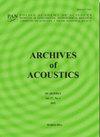两种 3D 打印防震结构的实验室测试和数值模拟 - 对比研究
IF 0.9
4区 物理与天体物理
Q4 ACOUSTICS
引用次数: 0
摘要
本文比较了采用 MJF 三维打印技术和两种不同材料制作的两种防震系统模型(I 和 II)的测试结果。研究包括实验室测试和数值模拟,假设材料和结构模型的机械性能为线性。这项研究的目的是评估实验室测试和数值模拟结果之间的一致性。此外,还对使用 MJF 技术生产防震系统的适用性进行了评估。在实验室测试期间,使用高速摄像机记录了两种结构模型对激振器产生的振动的响应。随后使用 MOVIAS Neo 软件进行了图像分析。获得的振动位移和共振频率值用于验证 Simcenter Femap 软件创建的数值模型。确定了实验和模拟获得的共振频率值之间的相对差异。就结构模型 I 而言,在未考虑机械参数非线性的情况下创建数值模型是不合理的。对数值模拟过程中确定的位移进行比较后发现,两个模型与实验室测试结果的相对差异均小于 16%。这一比较结果表明该参数的模拟精度令人满意。通过对 MJF 技术生成的印刷品的质量和精确度进行评估,得出的结论是,由于在创建印刷品的过程中会形成内应力,因此在该技术中使用 "软 "材料是有问题的。本文章由计算机程序翻译,如有差异,请以英文原文为准。
Laboratory Tests and Numerical Simulations of Two Anti-Vibration Structures Made by 3D Printing – Comparative Research
This article presents a comparison of test results from two models of anti-vibration systems (I and II) made employing MJF 3D printing technology and two different materials. The research included laboratory tests and numerical simulations, assuming a linear nature of the mechanical properties for the materials and models of structures. The aim of this research was to assess the consistency between laboratory test and numerical simulation results. In addition, evaluation of the suitability of using MJF technology to produce anti-vibration systems was conducted. During the laboratory tests, the response of the two models of structures to vibrations generated by an exciter was recorded using a high-speed camera. Subsequent image analysis was performed using the MOVIAS Neo software. The obtained values of vibration displacements and resonant frequencies were used to validate the numerical model created in the Simcenter Femap software. Relative differences between the values of resonant frequencies obtained experimentally and through simulations were determined. In the case of the structural model I, creating its numerical model without considering the non-linearity of mechanical parameters was found to be unjustified. The comparison of the displacements determined during numerical simulations showed relative differences of less than 16% for both models in relation to the laboratory test results. This comparison result indicates a satisfactory accuracy in simulating this parameter. An assessment of the quality and accuracy of MJF technology-produced prints, led to the conclusion that due to the formation of internal stresses during the print creation, the use of “soft” materials in this technology is problematic.
求助全文
通过发布文献求助,成功后即可免费获取论文全文。
去求助
来源期刊

Archives of Acoustics
物理-声学
CiteScore
1.80
自引率
11.10%
发文量
0
审稿时长
6-12 weeks
期刊介绍:
Archives of Acoustics, the peer-reviewed quarterly journal publishes original research papers from all areas of acoustics like:
acoustical measurements and instrumentation,
acoustics of musics,
acousto-optics,
architectural, building and environmental acoustics,
bioacoustics,
electroacoustics,
linear and nonlinear acoustics,
noise and vibration,
physical and chemical effects of sound,
physiological acoustics,
psychoacoustics,
quantum acoustics,
speech processing and communication systems,
speech production and perception,
transducers,
ultrasonics,
underwater acoustics.
 求助内容:
求助内容: 应助结果提醒方式:
应助结果提醒方式:


